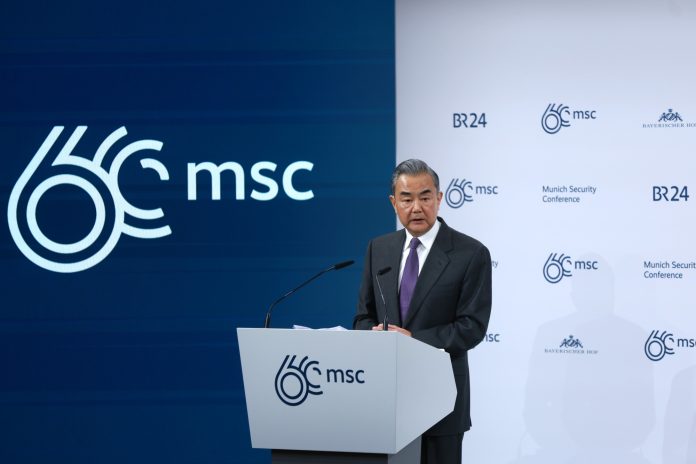Chinese Foreign Minister Wang Yi made a strong defence of Beijing’s ties with Moscow and warned the West against crossing a red line on Taiwan during a speech at the Munich Security Conference on Saturday.
Wang presented Beijing as a credible player in case Donald Trump is re-elected as the new US leader:
“No matter how the world changes, China is a responsible major country that will keep its major principles and policies consistent and stable… In a turbulent world China will be a force for stability,” he said.
A day after Wang met with his American counterpart Antony Blinken, he also made thinly veiled remarks about the US and strongly rejected a direct request to lash out at Russia over its conflict with Ukraine.
Countering criticism of Beijing’s close ties with Moscow, Wang said the relationship was based on “no alliances, no confrontation and not targeting any third party.”
European leaders often point to Chinese leader Xi Jinping’s regular contacts with his Russian counterpart Vladimir Putin since the conflict broke out, compared to his single phone conversation with Ukrainian President Volodymyr Zelensky. Beijing is said to have sent a delegate to only one of a number of Kyiv-backed peace talks.
Beijing’s top diplomat responded that China had been “working relentlessly to promote peace and peace talks” but there were “no ripe conditions in place for parties to go back to the negotiating table.”
Wang also claimed that Xi had “in-depth exchanges with world leaders including Russian and Ukrainian leaders” and China’s special envoy, Li Hui, had “travelled intensively to mediate among different parties.”
Moderator and conference chairman Christoph Heusgen asked if China would accept a “code of conduct for the South China Sea,” given the threats to navigation and “risky encounters” in the disputed waters and the Taiwan Strait – as well as the Red Sea:
“The Taiwan question cannot be compared with what’s happening in the Red Sea. The Taiwan question is China’s internal affair… Taiwan is a part of China. It has never been a country,” Wang said in response.
Referring to the situation in the Middle East, he urged for a two-state solution to the Israeli-Palestinian conflict, maintaining attempts to portray Beijing as the leader of the Global South.
“Efforts should be made towards a two-state solution. Only when that is realised can the state of Palestine and the state of Israel live in peace, and with assurance from the international community, can enduring security enjoyed by Israel,” Wang said.
Wang’s speech at noon on the second day of the annual meeting in Munich, dubbed the “Davos of Defence,” followed speeches by German Chancellor Olaf Scholz and Ukrainian President Volodymyr Zelensky.
Wang met with counterparts from Britain, the European Union and the United States in the Bavarian city on Friday. After the Wang-Blinken meeting, both sides released statements that were noticeably more conciliatory than a year earlier, when the pair met in Munich amid a row over a Chinese surveillance balloon.
